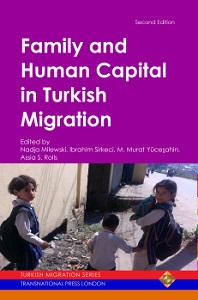Human capital exchange between Germany and Turkey. A focus on Turkish students in Germany
Human capital exchange between Germany and Turkey. A focus on Turkish students in Germany
Author(s): Rebecca Tlatlik, Beatrice Knerr
Subject(s): Geography, Regional studies, Labor relations, Higher Education , Migration Studies, Human Resources in Economy
Published by: Transnational Press London
Keywords: Germany; Turkey; human capital exchange; students; labor market;
Summary/Abstract: Germany is facing a shrinking and ageing population due to a sustained decline of the country’s birth rate and a longer life expectancy of its population. As a result, the population is expected to decrease to 70 million in 2030 (BMAS, 2011), from 80.62 million in 2013 (Statistisches Bundesamt, 2014), while the labour force is predicted to drop by 4% between 2010 and 2020 (OECD, 2013a). The German Federal Employment Agency (FEA), moreover, expects a skilled labour deficit of around 5.4 million in 2025 (FEA, 2011). This development preoccupies policymakers as well as business representatives, because the availability of highly qualified human capital is seen as a basis for the country´s prosperity (Czernomoriez, 2009). Especially the growing shortage of specialists in the MINT subjects, i.e. Mathematics, Informatics, Natural Science and Technique, might have severe consequences for the economy. In order to find a way to cope with this situation, the attraction of highly skilled people from abroad has come into the focus of German politics. Hence, with the New Immigration Act (“Zuwanderungsgesetz”) in 2005, Germany officially accepted its status as an immigration country, and accordingly put a regulatory framework in place. Consequently, the new law and its following modifications made Germany one of the countries with the lowest entry restrictions to the domestic labor market towards highly-skilled migrants within the OECD area (OECD, 2013a).
Book: Family and Human Capital in Turkish Migration
- Page Range: 91-100
- Page Count: 10
- Publication Year: 2015
- Language: English
- Content File-PDF

